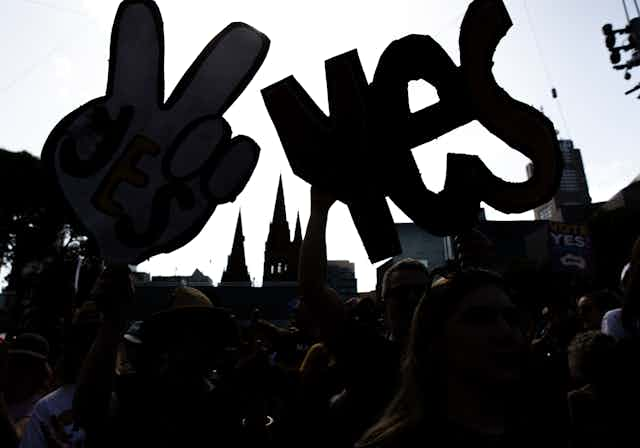A majority of Australians have indicated they will vote “no” in the upcoming referendum on the Indigenous Voice to Parliament, according to a national Essential poll conducted Sept. 13–17 from a sample of 1,135 people.
The poll gave the “no” side a 51–41% lead over the “yes” side, compared to a 48–42% lead two weeks ago.
On voter strength, 42% said they were a hard “no” (up one percentage point), 28% were a hard “yes” (down two points), 12% were a soft “yes” (steady) and 8% were a soft “no” (up one point). The figures don’t add up to the overall “yes” and “no” totals due to rounding.
Below is the updated 2023 Voice aggregated polls graph. Essential has been the best pollster for “yes”, but now even this poll is showing a 10-point national lead for “no”. In every poll conducted since June by all pollsters, support for the “yes” side has been declining steadily.

The polling indicates the Voice referendum is headed for a heavy defeat. I wrote in my article on the last Newspoll that it was a blunder to hold this referendum as a standalone vote rather than with a general election, given the long history of failed referendums in Australia.
Large crowds at weekend rallies for the “yes” side do not imply the polls are wrong, as people who attend political rallies are very unrepresentative of the overall voting-age Australian population. Analyst Kevin Bonham has more in this long article debunking “poll denial” themes.
Read more: Albanese records first net negative Newspoll approval as Voice support slumps further
Labor at post-election low in Essential’s voting intentions
In Essential’s two-party estimate that includes undecided voters, Labor led the Coalition by 49–45%, down from a 51–43% lead a fortnight ago.
This is the lowest Labor lead in Essential’s fortnightly polls since it started asking about voting intentions in December 2022. The previous lowest Labor lead was five points in March and July.
Primary votes were 32% Coalition (steady), 31% Labor (steady), 13% Greens (down two points), 8% One Nation (up one point), 2% UAP (steady), 8% for all others (up one point) and 6% undecided (steady). The drop for the Greens means fewer preferences for Labor.
On what was causing the rising cost of living, 49% of those polled thought businesses maximising profits for shareholders contributed more than wage and salary increases for workers, while 32% blamed workers’ salaries more.
On power in the workplace, 42% thought it tilted too much in favour of employers, 12% said it was too much in favour of workers, and 46% thought the balance about right.
A majority of respondents supported the three proposed changes to workplace laws, with
79% backing a new offence for employers to knowingly underpay their workers
66% supporting the closure of loopholes to prevent employers from using labour hire workers to undercut full-time workers
and 54% supporting minimum rights and entitlements for gig workers.
In other Canberra news, there will be no double dissolution election over Labor’s housing bill after it passed parliament on Sept. 14 with Greens support after the two parties reached a deal, ending months of conflict.
Other national polls
In last week’s Morgan federal poll, conducted Sept. 4–10 from a sample of 1,382 people, Labor led the Coalition by 52.5–47.5%, a 0.5-point gain for the Coalition from the previous week. Primary votes were 37% Coalition, 32% Labor, 13.5% Greens and 17.5% for all others.
I previously covered the continued tumble in Voice support and Prime Minister Anthony Albanese’s ratings from a national Resolve poll for Nine newspapers that was conducted September 6–9 from a sample of 1,604 people.
In other questions related to Qantas in that poll, 64% thought foreign airlines should be granted more flights to Australia to increase competition, while just 15% thought they should be limited in the national interest.
By a 69–17% margin, participants thought it unacceptable for politicians to accept free lounge memberships from Qantas.
Participants were also asked to give a positive, negative or neutral rating for each airline. More respondents had a negative view of Qantas (42%) than positive (26%), and a negative view of former Qantas chief executive Alan Joyce (54–6%).
Both Virgin Australia and Qatar Airways had higher positive ratings of 41% and 29%, respectively, than negative.

NSW Resolve poll: Labor drops but still well ahead
A New South Wales Resolve poll for The Sydney Morning Herald, conducted with the federal August and September Resolve polls from a sample of 1,019 people, gave Labor 38% of the primary vote (down three points since July), the Coalition 36% (up four points), the Greens 9% (down one point), independents 13% (up two points) and others 4% (down one point).
No two-party estimate was provided by Resolve, but The Poll Bludger estimated Labor would lead the Coalition by 54–46%, a 4.5-point gain for the Coalition since July. This is close to Labor’s 54.3–45.7% win at the March state election.
Labor incumbent Chris Minns maintained a 41–14% lead over the Liberals’ Mark Speakman as preferred premier (compared to 39–12% in July).
Respondents were also asked about a recent scandal involving Tim Crakanthorp, Labor MP and former minister for the Hunter, over revelations that his family owned several commercial properties in the Hunter region that he had not disclosed.
On the appropriate action, 48% thought Crakanthorp should be stood down and independently investigated, while 29% thought he should be disciplined by the party or parliament and 7% thought no action should be taken.

